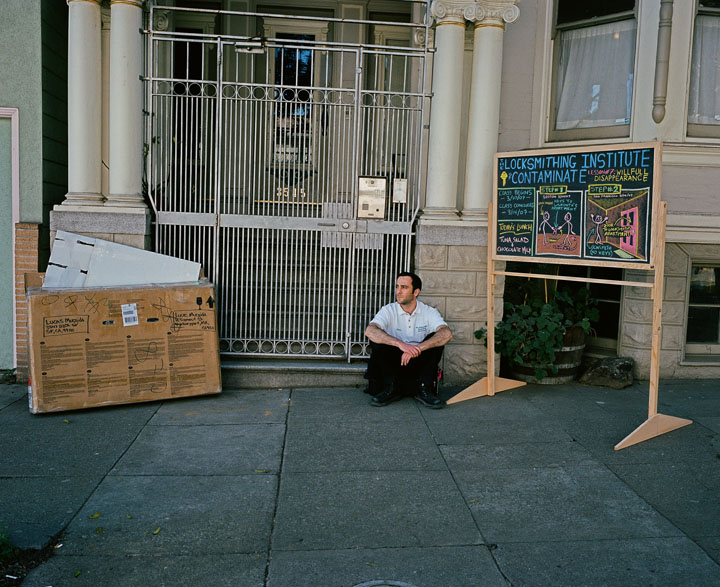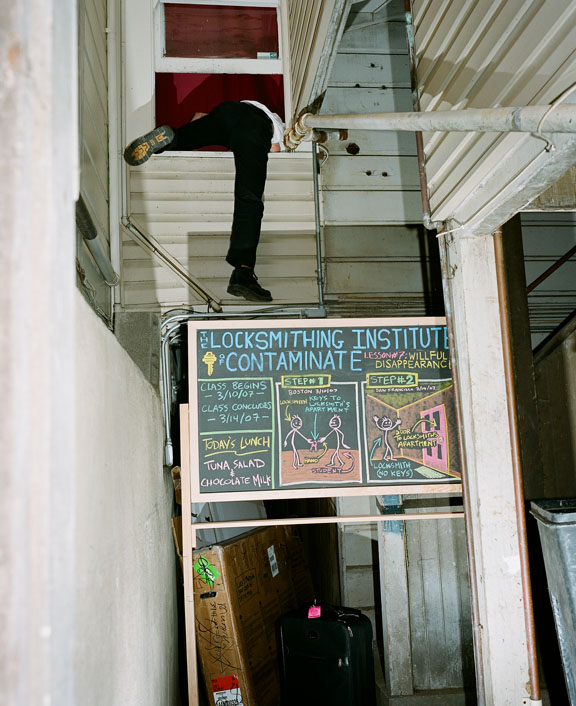The Locksmithing Institute of Contaminate, Part #2, San Francisco, CA, March, 2007
Students were given a copy of the keys to the instructors apartment in San Francisco. They were told that when he returned form Boston four days after the show that he would be locked out of his apartment. Special thanks to Chris Woodcock for taking pictures of the experience. Below is the instructors first hand experience of what happened when he got back to San Francisco:
—————-
March 9, 2007:
I had no plan when I got off the plane in San Francisco. I was not relishing the opportunity to be locked out. I was annoyed and mad at myself for making art work like this. I just wanted to go home and hide. My intentions: To create a work of performance art that was not only in the moment, but transcended the moment as well. This could be accomplished by insisting that the audience at the performance event was not witnessing my performance. The true action and intended purpose of my performance was going to happen in the future and the audience would not be able to witness it. They only knew that there was something occurring outside of there field of perception that they are directly connected to. The connection was represented by the gesture of me giving my keys to each of the audience members. By giving my keys to stranger I set up the opportunity for someone to invade the life of myself and my roommates. Though I can not control the way in which someone interacts with my piece my intention was not to provide the opportunity for someone to do this. My intention was to be locked out of my apartment. Getting off the plane I took the subway to my apartment. All the while worrying that someone will abuse or misunderstand my gesture and decide to enter my private world. I attached to all the things in room and decided which I could live without and which would be devastating to lose. Which I could afford to replace and which were irreplaceable. I did not want to be locked out. I began to figure out the path of least resistance. I planned what I would say to my roommates when I called and said I was locked out. How I would get in contact with them. More than anything else, I was exhausted.
Arriving at the gate to my apartment building I began to call one of my roommates who was at work. Before I could dial any numbers one of the people that lives in my building came downstairs. She let me in the gate. I told her that I was locked out and I needed to go down her back stairwell to see if I could get into my apartment. She let me into the building. I went down the back stair well and was happy to find a safe place to put my bags while I figured out what to do. I decided to see if I could break into my apartment. I climbed up a wall and piled up some cinder blocks and was able to reach one of the windows to my room. I managed to pop the window open and climbed in. I was locked out for about twenty minutes. This is not the first time that I have done things like this as a locksmith. I have climbed up pipes, jumped down porches, squeezed under garage doors…what ever it took to get in a person in. This is not as noble as it seems. If I don’t get the customer in I don’t get paid. Climbing through my window on March 14th I felt like I was entering a strangers room. I had never experienced my room from this vantage point. Despite my worry and the desire that I felt on the plane to be in my room, when I finally was there I didn’t associate with a single thing in there. None of it seemed like mine. None of it seemed important. It was not my room. The only emotion that was distinct was a sense of relief that the piece was over and that it wasn’t too annoying of an experience. I had to work the next morning. I had people and obligations that I was expected to take care off. These are my baggage. These are the things that I attach to and from which I develop my notion of myself. These are my keys. In the end it was the obligations that I couldn’t handle living without and the thought of letting those obligations down was devastating to me. However, the material things in the room meant very little to me. Those are heavy and bulky keys for me. Truthfully, more than anything else I learned that my apartment is terribly insecure. And judging by my reaction, so am I. Full lesson plan below:
———————–
The Locksmithing Institute of Contaminate
Lesson #7: Willful Disappearance
In lesson #7 the students of The Locksmithing Institute of Contaminate will be instructed in the ancient locksmithing technique of disappearance.
First, to understand this concept better we must broaden our definition of keys. All of the people, ideas, things and places in our life are keys. All of these allow us to enter or exit certain physical and mental spaces. Most keys unlock our feelings of safety. They do this by permitting us access to ideas that we associate with our sense of security. Some examples of these are: homes, cars, favorite cookies, or relationships to loved ones. When a person loses their keys typically they panic. This reaction and attachment implies that one cannot manifest their own feelings of security without their keys. Suffering stems from this attachment. This is because we have great difficultly imaging what existence might be like without keys acting as our filter.
In Lesson #4 of The Locksmithing Institute students were taught how to find their lost keys. This lesson arose from the observation that even the best locksmith can only make someone a new set of keys. Though this is a good service it fails to restore the sense of security that a persons old key afforded them. In the end people don’t want a new set of keys; what they really want are their old keys back. From there, students who enrolled in Lesson #5 were taught how to change their relationship to their keys. To do this a furnace was constructed. Next, the students were given the opportunity to place one of their keys in the furnace. The molten metal that remained was then poured it into a new, abstract form. It was still their same key, only their relationship to it had changed. In Lesson #6 students were given the chance to lose their keys of their own free will. By choosing to do this (as opposed to accidentally doing it) students took another step towards developing their own feelings of security separate from their keys.
Those three lessons of The Locksmithing Institute dealt with, at their core, matters of “perception.” More specifically they are about things moving in or out our frame of reference. This has less to do with ones physical eye and more to do with the “minds eye.” The standard association that is placed upon the word “disappearance” is that something is gone and it’s where a bouts is unknown. However the simple meaning of the word is that something is no longer within our “sight” or to ceases to “appear” before us. “Appear” is strongly linked to the present tense. It is something that is occurring even as we are perceiving it. “Disappear” is no different. It is something that is happening in the present that we are connected to. Something that is always in the process of occurring.
To explicate this point Instructor will give an example of this in Lesson #7. On Friday March the 9h of 2007 he will be giving each of the students of Contaminate copies of the keys to his apartment in San Francisco. At approximately 6:00 PM EST on March 14th upon returning from Boston, he will be locked out of his apartment in San Francisco. For the instructor, his keys are not gone, they are simply out of sight. For the students, Lesson #7 is occurring but it is not within their sight. There are many things that we are intrinsically connected to that our perception is incapable of detecting. When events or keys slip out of our frame of reference they become endowed with other worldly ability it exist long past their life ever would have permitted. Because of this Lesson #7 will always be occurring. This is the embedded significance of disappearance. It is the transcendence of the moment. And, when students stumble upon the Instructors keys weeks, months, or even years later they will re-knew their connection to the ever evolving event.

